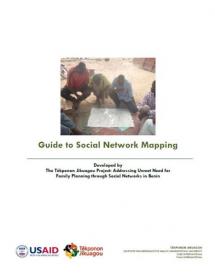Guide to Social Network Mapping / Guide de la Cartographie des Réseaux Sociaux
This guide was developed for the Tékponon Jikuagou (TJ) project in Benin.
The project used social network analysis to identify the most influential and connected networks in a community and to assess the influence of men’s and women’s networks on fertility beliefs, attitudes, desires, intentions and behaviors relating to family planning. Interventions then worked with key actors in individuals’ social networks, as well as the network structures themselves to promote reflection on existing social norms, allowing people to recognize for themselves how norms and attitudes may negatively influence reproductive health and family planning. It also capitalized on these networks to diffuse reflection on and consideration of different social norms and attitudes as they relate to family planning and fertility.
In this context, TJ developed a set of participatory learning exercises, collectively named the Social Network Mapping Guide, which facilitates discussions with communities to learn about groups and formal and informal leaders in a village and to gain a general understanding of how a community is socially organized. The tool helps outsiders to understand which groups and individuals are most socially connected and respected – those influencing social networks and the spread of ideas and attitudes – to help make decisions about which groups and people with whom TJ could work. A core part of exercises in the tool involves an innovative variation of community mapping, which focuses on learning about community social dynamics and organizatitions.
The attached file includes the guide and all of the exercises in both English and French.
Source: Institute for Reproductive Health/Georgetown
Date of Publication: March 25, 2019
SIMILIAR RESOURCES
Tools
Examples
- How-To Guide for a Social Network Diffusion Intervention to Overcome Social Barriers to Family Planning
- The REPLACE Approach: Supporting Communities to End FGM
- SBCC Mapping Tool for Assessment
- Saving Newborn Lives: Champions Toolkit
- Measuring Social and Behavioural Drivers of Child Protection Issues: Guidance Tool
- Entertainment-Education Curriculum
- Lever les Tabous: La sexualité et les approches promouvant l’égalité des genres pour mettre fin aux unions et aux mariages d’enfants, précoces et forcés
- How Businesses Can Invest in Women and Realize Returns
- Accelerator Behaviors
- 18F Methods Cards
- Effects of a Social Network Diffusion Intervention on Key Family Planning Indicators - Impacts d’une Intervention de Diffusion via les Réseaux Sociaux sur les Indicateurs Clés de la Planification Familiale
- Module de formation des Relais Communautaires
- IPC Training Aid Video and User's Manual
- How to Manage a Facebook Page
- Community Mobilisation Toolkits and Fact Sheet

